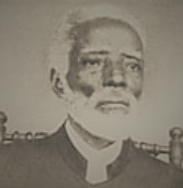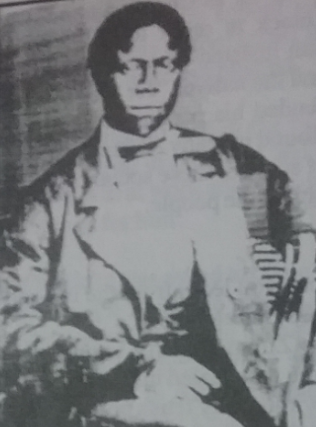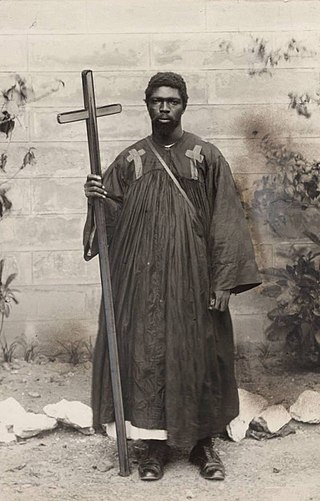Methodism, also called the Methodist movement, is a Protestant Christian tradition whose origins, doctrine and practice derive from the life and teachings of John Wesley. George Whitefield and John's brother Charles Wesley were also significant early leaders in the movement. They were named Methodists for "the methodical way in which they carried out their Christian faith". Methodism originated as a revival movement within Anglicanism originating out of the Church of England in the 18th century and became a separate denomination after Wesley's death. The movement spread throughout the British Empire, the United States and beyond because of vigorous missionary work, and today has about 80 million adherents worldwide.
The Church of the Province of West Africa is a province of the Anglican Communion, covering 17 dioceses in eight countries of West Africa, specifically in Cameroon, Cape Verde, Gambia, Ghana, Guinea, Liberia, Senegal and Sierra Leone. Ghana is the country with most dioceses, now numbering 11.
Christian liturgy is a pattern for worship used by a Christian congregation or denomination on a regular basis. The term liturgy comes from Greek and means "public work". Within Christianity, liturgies descending from the same region, denomination, or culture are described as ritual families.

In Christianity, worship is the act of attributing reverent honour and homage to God. In the New Testament, various words are used to refer to the term worship. One is proskuneo which means to bow down to God or kings.

Carl Christian Reindorf was a Euro-African-born pioneer historian, teacher, farmer, trader, physician and pastor who worked with the Basel Mission on the Gold Coast. He wrote The History of the Gold Coast and Asante in the Ga language; scholars consider the book a “culturally important” work and an increasingly important source for Ghanaian history. The work was later translated into English and published in 1895 in Switzerland. He used written sources and oral tradition, interviewing more than 200 people in the course of assembling his history.
Articles related to Ghana include:

Traditional religions such as the Akan Traditional Religion and Dagbon Traditional Religion are the indigenous religions of Ghana. Islam was the first Abrahamic religion to be introduced in the country between the tenth and 15th centuries, by Muslim traders. Later, Christianity was introduced via contact with the European missionaries. Today, Christianity is the largest religion in Ghana, with substantial adherents of Islam and traditional faiths. Christianity is mainly in the country's south while Islam is based in the north. Islam gained widespread acceptance in northern Ghana after Yaa Naa Zanjina accepted the faith in the 17th century.

Thomas Birch Freeman was an Anglo-African Wesleyan minister, missionary, botanist and colonial official in West Africa. He is widely regarded as a pioneer of the Methodist Church in colonial West Africa, where he also established multiple schools. Some scholars view him as the "Founder of Ghana Methodism". Freeman's missionary activities took him to Dahomey, now Benin as well as to Western Nigeria.
Akuapem, also known as Akuapim, Akwapem Twi, and Akwapi, is one of the principal members of the Akan dialect continuum, along with Bono and Asante, with which it is collectively known as Twi, and Fante, with which it is mutually intelligible. There are 626,000 speakers of Akuapem, mainly concentrated in Ghana and southeastern Cote D'Ivoire. It is the historical literary and prestige dialect of Akan, having been chosen as the basis of the Akan translation of the Bible.

Christianity is the religion with the largest following in Ghana. Christian denominations include Catholics, Methodists, Anglicans, Presbyterians, Lutherans, Seventh-Day Adventists, Pentecostals, Baptists, Evangelical Charismatics, Latter-day Saints, etc.

The Presbyterian Church of Ghana is a mainstream Protestant and ecumenically-minded church denomination in Ghana. The oldest, continuously existing, established Christian Church in Ghana, it was started by the Basel missionaries on 18 December 1828. The missionaries had been trained in Germany and Switzerland and arrived on the Gold Coast to spread Christianity. The work of the mission became stronger when Moravian missionaries from the West Indies arrived in the country in 1843. In 1848, the Basel Mission Church set up a seminary, now named the Presbyterian College of Education, Akropong, for the training of church workers to help in the missionary work. The Ga and Twi languages were added as part of the doctrinal text used in the training of the seminarians. In the 19th and early 20th centuries, the Presbyterian church had its missions concentrated in the southeastern parts of the Gold Coast and the peri-urban Akan hinterland. By the mid-20th century, the church had expanded and founded churches among the Asante people who lived in the middle belt of Ghana as well as the northern territories by the 1940s. The Basel missionaries left the Gold Coast during the First World War in 1917. The work of the Presbyterian church was continued by missionaries from the Church of Scotland, the mother church of the worldwide orthodox or mainline (oldline) Presbyterian denomination. The official newspaper of the church is the Christian Messenger, established by the Basel Mission in 1883. The denomination's Presbyterian sister church is the Evangelical Presbyterian Church, Ghana.

The Ahmadiyya Muslim Community is the second largest group of Islam in Ghana after Sunni Islam. The early rise of the Community in Ghana can be traced through a sequence of events beginning roughly at the same time as the birth of the Ahmadiyya movement in 1889 in British India. It was during the early period of the Second Caliphate that the first missionary, Abdul Rahim Nayyar was sent to what was then the Gold Coast in 1921 upon invitation from Sunni Muslims in Saltpond. Having established the movement in the country, Nayyar left and was replaced by the first permanent missionary, Al Hajj Fadl-ul-Rahman Hakim in 1922.

Johann Gottlieb Christaller was a German missionary, clergyman, ethnolinguist, translator and philologist who served with the Basel Mission. He was devoted to the study of the Twi language in what was then the Gold Coast, now Ghana. He was instrumental, together with African colleagues, Akan linguists, David Asante, Theophilus Opoku, Jonathan Palmer Bekoe, and Paul Keteku in the translation of the Bible into the Akuapem dialect of Twi. Christaller was also the first editor of the Christian Messenger, the official news publication of the Basel Mission, serving from 1883 to 1895. He is recognised in some circles as the "founder of scientific linguistic research in West Africa".
Titus Awotwi Pratt is a Ghanaian educationist and minister. He was the Presiding Bishop of the Methodist Church Ghana. He has served as the head of the Methodist Church in The Gambia as well as the Bishop of Accra. He spent the early years of his ministry as an assistant minister at Roundhay Methodist Church in Leeds, United Kingdom.
Gold Coast Euro-Africans were a historical demographic based in coastal urban settlements in colonial Ghana, that arose from unions between European men and African women from the late 15th century – the decade between 1471 and 1482, until the mid-20th century, circa 1957, when Ghana attained its independence. In this period, different geographic areas of the Gold Coast were politically controlled at various times by the Portuguese, Germans, Swedes, Danes, Dutch and the British. There are also records of merchants of other European nationalities such as the Spaniards, French, Italians and Irish, operating along the coast, in addition to American sailors and traders from New York, Massachusetts and Rhode Island. Euro-Africans were influential in intellectual, technocratic, artisanal, commercial and public life in general, actively participating in multiple fields of scholarly and civic importance. Scholars have referred to this Euro-African population of the Gold Coast as "mulattos", "mulatofoi" and "owulai" among other descriptions. The term, owula conveys contemporary notions of "gentlemanliness, learning and urbanity" or "a salaried big man" in the Ga language. The cross-cultural interactions between Europeans and Africans were mercantile-driven and an avenue to boost social capital for economic and political gain i.e. "wealth and power." The growth and development of Christianity during the colonial period also instituted motifs of modernity vis-à-vis Euro-African identity. This model created a spectrum of practices, ranging from a full celebration of native African customs to a total embrace and acculturation of European culture.

David Asante was a philologist, linguist, translator and the first Akan native missionary of the Basel Evangelical Missionary Society. He was the second African to be educated in Europe by the Basel Mission after the Americo-Liberian pastor, George Peter Thompson. Asante worked closely with the German missionary and philologist, Johann Gottlieb Christaller and fellow native linguists, Theophilus Opoku, Jonathan Palmer Bekoe, and Paul Staudt Keteku in the translation of the Bible into the Twi language.

Samson Kwame Oppong also Sampson Opon or Opong was a controversial Akan Christian preacher-prophet on the Gold Coast in the 1920s. His missionary zeal, unconventional and fiery ministry helped entrench Methodism in the Ashanti and Brong-Ahafo Regions of Ghana, through a large-scale spiritual awakening and revival. Though his knowledge of Christian theology was minimal, he is known to have employed threats and other coercive techniques to proselytise in the Ghanaian towns and villages he worked in.
Paul Kwabena Boafo is a Ghanaian theologian and minister who was elected as the twelfth Presiding Bishop of the Methodist Church Ghana in 2018. He previously served as the Administrative Bishop of the Church. He is the first ordained minister to serve in both capacities in the episcopal history of the Ghanaian Methodist Church. Boafo also served as the Protestant Chaplain of the Kwame Nkrumah University of Science and Technology (KNUST).
Protestant liturgy or Evangelical liturgy is a pattern for worship used by a Protestant congregation or denomination on a regular basis. The term liturgy comes from Greek and means "public work". Liturgy is especially important in the Historical Protestant churches, both mainline and evangelical, while Baptist, Pentecostal, and nondenominational churches tend to be very flexible and in some cases have no liturgy at all. It often but not exclusively occurs on Sunday.

Ghana–United Kingdom relations are the diplomatic, historical and trade relations between Ghana and the United Kingdom. Modern state Ghana-UK relations began when Ghana became independent from the UK in 1957.


















